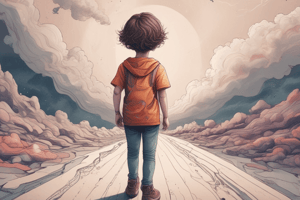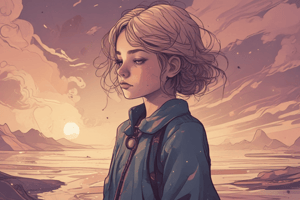Podcast
Questions and Answers
Which of the following is a symptom of severe depression?
Which of the following is a symptom of severe depression?
- Feeling helpless and powerless
- Feeling tired and listless
- Feeling anxious and tearful
- Feeling totally despair and worthless (correct)
What is the primary goal of treatment for postpartum depression?
What is the primary goal of treatment for postpartum depression?
- To reduce the risk of suicide
- To improve the mother's self-esteem
- To promote bonding between the mother and infant
- To alleviate symptoms of depression (correct)
Which of the following is a characteristic of bereavement overload?
Which of the following is a characteristic of bereavement overload?
- Loss of appetite and sleep disturbances
- Symptoms of depression often confused with symptoms of neurocognitive disorder
- High percentage of suicides among the elderly (correct)
- Risk of suicide
What is the primary focus of the nursing process in assessing depression?
What is the primary focus of the nursing process in assessing depression?
What is a characteristic of mild depression?
What is a characteristic of mild depression?
What are common symptoms of depression in children under the age of 3?
What are common symptoms of depression in children under the age of 3?
What is a goal of therapy with depressed children?
What is a goal of therapy with depressed children?
What is a common symptom of depression in adolescents?
What is a common symptom of depression in adolescents?
What is a type of therapy commonly used to help younger depressed children?
What is a type of therapy commonly used to help younger depressed children?
What warning label do all antidepressants carry for children and adolescents?
What warning label do all antidepressants carry for children and adolescents?
Study Notes
Developmental Implications
- Childhood depression:
- Symptoms vary by age:
- < age 3: feeding problems, tantrums, lack of playfulness, emotional expressiveness, failure to thrive, delays in speech and gross motor
- Ages 3-5: accident proneness, phobias, excessive self-reproach
- Ages 6-8: physical complaints, aggressive behavior, clinging behavior, lack of social skills
- Ages 9-12: morbid thoughts and excessive worrying, lack of interest to play with friends
- Other symptoms: hyperactivity, delinquency, school problems, sleeping and eating disturbances, social isolation, suicidal thoughts
- Focus of therapy: alleviate symptoms, strengthen coping and adaptive skills, and prevent future psychological problems
- Symptoms vary by age:
Adolescence
- Symptoms: anger, aggressiveness, running away, delinquency, social withdrawal, sexual acting out, substance abuse, restlessness, apathy
- Clue to differentiate depression from normal adolescent behavior: TBD
- Treatment:
- Supportive psychosocial intervention
- Antidepressant medication (carry FDA black-box warning for increased risk of suicidality)
Senescence
- Bereavement overload
- High percentage of suicides among the elderly
- Symptoms of depression often confused with symptoms of neurocognitive disorder
- Treatment:
- Antidepressant
- Electroconvulsive therapy
- Psychosocial therapies
Postpartum Depression
- Lasts weeks to months
- Associated with hormonal changes, tryptophan metabolism, or cell alterations
- Symptoms:
- Fatigue, irritability
- Loss of appetite
- Sleep disturbances
- Loss of libido
- Concern about inability to care for infant
- Treatment:
- Antidepressants
- Psychosocial therapies
Nursing Process/Assessment
- Severe depression marked by distress that interferes with social, occupational, cognitive, and emotional functioning
- Four spheres of human functioning:
- Affective
- Behavioral
- Cognitive
- Physiological
Levels of Depression
- Transient depression:
- Symptoms not necessarily dysfunctional
- Affective: "the blues"
- Behavioral: some crying
- Cognitive: some difficulty getting mind off of one's disappointment
- Physiological: feeling tired and listless
- Mild depression:
- Symptoms associated with normal grieving
- Affective: anger, anxiety
- Behavioral: tearful, regression
- Cognitive: preoccupied with loss
- Physiological: anorexia, insomnia
- Moderate depression:
- Symptoms associated with dysthymic disorder
- Affective: helpless, powerless
- Behavioral: slowed physical movements, slumped posture, limited verbalization
- Cognitive: retarded thinking process, difficulty with concentration
- Physiological: anorexia or overheating, sleep disturbance, headaches
- Severe depression:
- Includes symptoms of major depressive disorder and bipolar depression
- Affective: feelings of total despair, worthless, flat affect
- Behavioral: psychomotor retardation, curled-up position, absence of communication
- Cognitive: prevalent delusional thinking, with delusions of persecution and somatic delusions, confusions, suicidal thoughts
- Physiological: a general slow-down of the entire body
Diagnosis/Outcome
- The client:
- Has experienced no physical harm to self
- Discusses feelings with staff and family
- Expresses hopefulness
- Sets realistic goals for self
- Is willingly able to interact with others
- Eats a well-balanced diet
Planning/Implementation
- Risk for suicide: vulnerable to self-inflicted, life-threatening injury
- Short-term goals:
- Client will seek out...
Studying That Suits You
Use AI to generate personalized quizzes and flashcards to suit your learning preferences.
Description
This quiz covers the symptoms of depression in children of different age groups, from infancy to pre-teen years. Learn about the common signs and behaviors associated with childhood depression.





